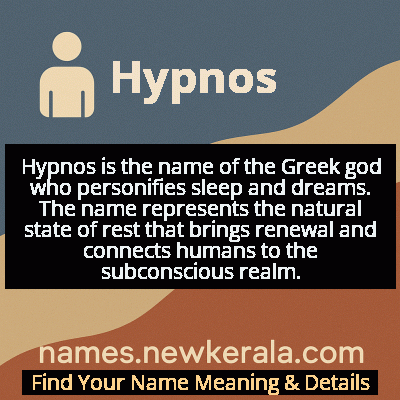Hypnos Name Meaning & Details
Origin, Popularity, Numerology Analysis & Name Meaning of Hypnos
Discover the origin, meaning, and cultural significance of the name HYPNOS. Delve into its historical roots and explore the lasting impact it has had on communities and traditions.
Name
Hypnos
Gender
Male
Origin
Greek
Lucky Number
7
Meaning of the Name - Hypnos
Hypnos is the name of the Greek god who personifies sleep and dreams. The name represents the natural state of rest that brings renewal and connects humans to the subconscious realm.
Hypnos - Complete Numerology Analysis
Your Numerology Number
Based on Pythagorean Numerology System
Ruling Planet
Neptune (Ketu)
Positive Nature
Intuitive, analytical, spiritual, and inquisitive.
Negative Traits
Secretive, reserved, aloof, and can be overly critical.
Lucky Colours
Green, yellow.
Lucky Days
Monday.
Lucky Stones
Cat’s eye, moonstone.
Harmony Numbers
1, 5, 6.
Best Suited Professions
Scientists, researchers, spiritual leaders, detectives.
What People Like About You
Depth of knowledge, analytical skills, spirituality.
Famous People Named Hypnos
Hypnos (Mythological)
Greek God
Personification of sleep, brother of Thanatos (Death), father of Morpheus (Dreams)
Hypnos of Lacedaemon
Ancient Greek Poet
Known for lyrical poetry about sleep and dreams, influenced later Hellenistic poets
Hypnos Alexandros
Hellenistic Philosopher
Wrote extensively on the nature of consciousness and sleep states
Name Variations & International Equivalents
Click on blue names to explore their detailed meanings. Gray names with will be available soon.
Cultural & Historical Significance
Temples and shrines dedicated to Hypnos existed throughout the Greek world, where people sought healing through dream incubation and prophetic visions. The mythological narratives surrounding Hypnos often explore themes of power, vulnerability, and the boundaries between different states of being, reflecting ancient Greek philosophical inquiries into consciousness and existence. His representation in art typically shows him as a youthful, winged god carrying a horn of sleep-inducing opium or touching someone with a sleep-bringing wand, symbolizing his gentle yet irresistible influence over all living beings.
Extended Personality Analysis
Individuals named Hypnos are typically perceived as calm, introspective, and deeply intuitive. They possess a natural affinity for understanding subconscious processes and often exhibit remarkable empathy and psychological insight. Their tranquil demeanor can be both soothing and mysterious, drawing others to them while maintaining an air of enigma. Hypnos-named individuals tend to be creative thinkers who value introspection and often demonstrate exceptional patience and timing in their actions.
They may appear detached or dreamy at times, but this often masks a profound depth of understanding about human nature and emotional currents. Their connection to the mythological sleep god suggests a personality that balances gentle persuasion with undeniable power—able to influence situations subtly while commanding respect through their quiet authority and wisdom about the hidden aspects of life. These individuals often excel in fields requiring deep concentration, psychological understanding, or creative visualization, and they typically approach challenges with a methodical, almost meditative quality that allows them to see solutions others might miss.
Modern Usage & Popularity
In contemporary times, Hypnos remains an uncommon but culturally significant name, primarily used by parents with strong interests in Greek mythology, classical studies, or unique mythological names. The name sees occasional usage in Greece and among diaspora communities, though it's more frequently encountered in artistic, academic, or gaming contexts rather than as a common given name. Recent years have shown a slight increase in usage, particularly among parents seeking distinctive mythological names that carry deep cultural resonance. The name appears occasionally in fantasy literature, video games, and neo-pagan communities, where its connection to sleep and dreams holds spiritual significance. While not appearing on mainstream baby name charts, Hypnos maintains a niche appeal for those appreciating its mythological weight and unique sound, often chosen by parents who value classical education or have personal connections to sleep-related professions or interests.
Symbolic & Spiritual Meanings
Hypnos symbolizes the universal human experience of sleep as a gateway to other realms of consciousness and being. Metaphorically, the name represents transition, rest, renewal, and the mysterious boundary between waking reality and the subconscious world. It embodies the concept of necessary pauses in life's journey—the quiet moments that allow for healing, reflection, and transformation. The symbolism extends to ideas of influence through subtle means rather than overt force, mirroring how sleep naturally overcomes even the most powerful beings. Hypnos also represents the interconnectedness of opposites, as sleep's relationship with death and waking life suggests the cyclical nature of existence. In psychological terms, the name symbolizes access to deeper layers of the self, intuition, and the creative potential of the unconscious mind, serving as a reminder of the importance of balance between activity and rest in human experience.

